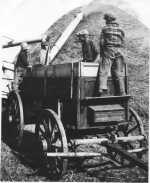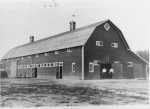| Page
1 | Page 2 | Page 3
Abe
J. Sawatzky was another CO who could have asked for a delay in military
service for agricultural reasons. He was newly married with a newborn
son. Without him, the farm would not be able to produce crops. Instead,
he became a CO.
“Through
much prayer and complete obedience to the Holy Spirit, I had complete
peace of mind, but I did experience some misunderstanding in the
neighborhood. I found out later that 2 men had phoned Regina and
complained about me being a CO, but I knew nothing of this at
the time.” [MHC, 1015-18]
Peter
J. Janzen could understand how others might feel towards him. For
this reason, he made an effort to reach out to others.
“I
not only helped out on my father's farm during this time, but
also helped in doing chores for neighbors whose son was in the
armed service.” [MHC, 1015-49]
COs
usually did farm work by themselves or with a few other COs. It
was nothing like the large CO gatherings in the forestry camps of
BC. Being alone and without support was perhaps more lonely, but
farm work had its advantages. One CO appreciated that he was able
to use his agricultural skills instead of being isolated in the
woods.
“The
fellowship in camp was a very good experience but our work in
the bush we felt was not of very much value if we could of worked
in the hospital or some other form of work we would of felt much
better. In the bush we felt we were just hidden from the eyes
of the public. On the farm later our work was of good value because
the farm owners were happy with us because were experienced farm
men and worked conscientiously.” [MHC, 1015-60]
 |
 |
| Threshing grain |
Typical prairie barn |
John
Friesen was assigned to work on a farm in Manitoba.
“My
employer (a dairy farmer from Germany ) was a Roman Catholic.
He seemed to be satisfied with my work. My employer had another
CO with whom he was not so happy. I helped remodel my employer's
house and was also sent to help build a RC Church. At this project
I met other RC farmers and their workers as this was a do-it-yourself
church building job for the German RCs of the district. I cannot
recall that I did any spectacular witnessing regarding my CO stand.
It seems that no one ever asked me about it. I was never jeered
for my CO status (as others seem to have been). Today I feel that
I should have witnessed more.”
While
Friesen may not feel that he should have been more outspoken, his
quiet example seems to have been enough.
“My
employer came to realize that even Mennonite COs were not all
the same. My employer felt that his other CO was lazy. I feel
that I convinced him that there were also eager workers. My employer's
wife must have been favorably impressed with my religious life,
because she at times would remind her husband that he did not
always say grace before meals but that I never forgot to do so.”
[MHC, 1015-38]
David
R. Schellenberg also made a good impression on his boss. Schellenberg
had initially done CO service for the Arctic Ice Company in Winnipeg
before moving to a farm.
“I
was about 2 years on a farm at Hazelridge. The boss had 3 brothers
in uniform. They all came back while I was there. They all thought
I had a right to my ideas and we were good friends. I was treated
as if I was a member of the family. I got $25 a month and $25
went to the Red Cross. For Christmas the boss gave me a Fifty
Dollar Victory Bond. I was there for 2 Christmases.”
“When
I left the farm I had to report back to the CO office which was
in the Paris Bldg. The judge said that my boss had sent in a very
good report from me, which he didn't have to do.” [MHC, 1015-13]
Page
1 | Page 2 | Page 3 |


